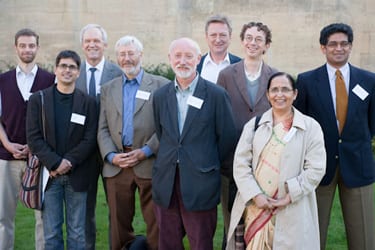
10–11 October 2009,
Somerville College, Oxford
This conference explores the use of categories in Indian philosophy, to include linguistic categories, aesthetic and emotional categories, universals and logical categories, metaphysical and ontological categories, and other possible processes of categorisation across different philosophical schools and diverse concepts. The goal is to shed a clear light on the modes of reasoning in the Indian philosophical traditions, illuminating its relation to Western methods, and its unique contribution to philosophy across the globe.
One of the characteristic features of ancient and medieval philosophy both east and west has been its propensity to analyse existence into particular categories and make fine distinctions in different philosophical areas. This conference would focus on the way this process has operated in the Indian philosophical context. For example, in Buddhism the Abhidharma developed sophisticated categories for the analysis of mind, Samkhya for the analysis of experience, and Nyaya Vaisheshika developed ontological categories. We might even call this process of categorisation a philosophical style of thinking.
The aim of this conference is to address this question of categorisation and to raise questions about what precisely it entails, why it developed to such a high degree in the Indian context, and to raise philosophical questions about the relevance and success of such philosophical endeavours. The conference therefore has a descriptive dimension. A comparative dimension is also welcome, considering parallel processes from other philosophical traditions.
Opening remarks
9.30am-11am Session One
Jonardon Ganeri, University of Sussex
The Seven Category Ontology Reaffirmed
Keynote Respondent: Ramprasad Chakravarthi
Chair: Gavin Flood
The six categories of being of Praśastapāda (substance, quality, motion, differentiator, universal, inherence), together with the category of non-being, constitute the ontology of classical Vaiśeṣika metaphysics. Raghunātha Śiromaṇi, the sixteenth century peer of Caitanya in Navadvīpa, put pressure on the classical system, arguing in favour of a radical expansion to include eight new categories: power (śakti), ownedness (svatva), moment (kṣaṇa), causehood (kāraṇatva), effecthood (kāryatva), number (saṃkhyā), the qualifying relation pertaining to absence (vaiśiṣṭya), and contentness (viṣayatā). In the seventeenth century, however, there was a reaffirmation of the seven category ontology in the work of thinkers like Mādhavadeva Bhaṭṭa and Jayarāma Pancānana. I will examine the philosophical significance of this reaffirmation. I will argue that Raghunātha’s expansion is based on a commitment to a form of non-reductive realism. What the seventeenth century philosophers introduce is a new concept of realism, one which defends the compossibility of reduction and realism with respect to some type of entity. This ‘sophisticated realism’ (Dummett) is what makes it possible for the reality of entities in Raghunātha’s new categories to be acknowledged, but combined with an affirmation of the seven category metaphysics. I will ask whether it is nevertheless the case that Raghunātha was right to think that there are types of property irreducible to those admitted in the traditional system.
11am-11.30 Coffee
11.30am-1pm Session Two
Johannes Bronkhorst, Université de Lausanne
Ontological Categories in Early Indian Philosophy
Chair: Jessica Frazier
This paper will address the question whether and to what extent the ontological categories of early Indian philosophies can be looked upon as what might be called ‘natural categories’, categories that correspond in some way to the reality they intend to describe. It turns out that some of the Indian categories are of this kind, others are not. Examples will be discussed.
1pm-2.30pm Lunch
2.30pm-4pm Session Three
Eivind Kahrs, University of Cambridge
On bhava – the ultimate category
Chair: Christopher Minkowski
Whereas some categories clearly are the outcome of mental deliberations, such as the dharma-taxonomies of the Buddhists, the padārthas of the Vaiśeṣikas, or the tattvas of the Sāṃkhyas, others seem to arise from within the cognitive models of Indian culture. This paper explores the concept of bhāva as one of the categories arising from within the Sanskrit linguistic and philosophical traditions and traces its transformation into one of the core categories of Sanskritic thought.
4pm-4.30pm Tea
4.30pm-6pm Session Four
Stephen Phillips, University of Texas, Austin
Nyaya’s pramana (Knowledge-Generators) as Natural Kinds
Chair: Eivind Kahrs
This paper examines Nyaya’s understanding of the sources of knowledge, especially perception and inference, as generating genuine subkinds of cognition that are discernible by introspection as well as through our own and others’ behaviour, and addresses how typological resources are used by the school in its epistemological theory. By being able to recognize a cognition as perceptual, inferential, analogical, or testimonial in character, we have access to our knowledge such that doubt and controversy can be resolved. The hinge premise is that we may assume such cognition to be veridical. Like contemporary disjunctivists, Naiyayikas see pramana as natural processes and their results as falling into natural kinds, with close imitators, illusions, incorrect inferences, false testimonial comprehension, and so on, as something else altogether, not the same at all, though a wider uniting kind may be identified, being-a-property, being-a-psychological-property, and so on up through the categorial system. This facet of Nyaya’s epistemology helps to solve an issue facing modern reliabilist externalism, which is the position that beliefs receive a default positive epistemic status in virtue of being the results of reliable processes of belief-formation. The issue is how to differentiate doxastic processes in an epistemically relevant fashion. Nyaya has a straightforward answer–identify candidates by the highest standard, one-hundred percent reliability, and correlating marks (jati-vyanjana)–an answer that this paper in the end says a word or two to defend.
7pm Shivdasani Conference Dinner (for speakers)